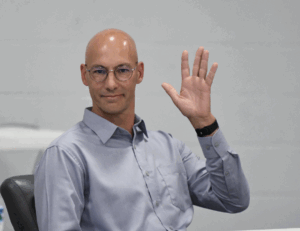
Wayne commissioners unanimously approve 10-percent sewer rate hike
Wayne County sewer customers will pay about 10 percent more beginning this month, in part in response to an anticipated increase in sewer treatment fees by the city of Goldsboro, county officials decided at their meeting Tuesday.
Members of the Board of Commissioners also are looking at the possibility of the future construction of a county sewer treatment plant as a cost savings measure and as a boost for economic development.
Facility services director Kendall Lee told the commissioners Tuesday that although the county has increased fees consistently over the last few years, the costs of operating the county portion of the system, which does not include a treatment plant, have been significant.
“We are really losing money with respect to our sewer,” Lee said.
Lee also told the commissioners that there have been problems with the city sewer billing, which he and his staff have tried to rectify.
Those concerns, as well as the rate that the city of Goldsboro is charging, are not allowing the county to accumulate a cushion to take care of potential equipment failures.
Sewer equipment is expensive, Lee said.
The facility services director emphasized that the proposed increase is not about making money. It is about meeting the county’s expenses responsibly.
The proposal, which the board approved unanimously, includes a 10.5 percent increase for sewer customers, and a potential minimum charge for those using the system. There is also an increase of 10.2 percent for outside customers who use the system.
Commission Chairman Wayne Aycock explained that since the county does not own a treatment plant, news about rate increases from the city is significant.
“We are kind of at the city’s mercy as to what we charge,” he said.
Several commissioners suggested that the county needs to be vigilant about watching the city’s decisions on rate increases, and that commissioners should be prepared to pass those additional costs on to system users.
Commissioner Joe Daugherty suggested that county officials make those moves quickly in part because the costs of maintaining the system should not be passed on to other county taxpayers.
“If you are a customer with the county sewer, that system has to be self-sustaining,” Daugherty said. “If there is a city increase, (that needs) to be passed on immediately.”
When the sewer fund is not self-sustaining, Daugherty said, the money to balance the account comes out of the county’s fund balance.
Commissioner Barbara Aycock, who has been working with Lee and county officials on sewer concerns, added that the county is not only paying the city’s regular rate, but also incurs an additional cost when its usage is higher.
“We are paying a premium rate to Goldsboro because we don’t have enough capacity,” she said. “We have had as much over capacity as we have had capacity.”
The county’s water districts are dealing with the same concerns, the commissioners said, adding that a meeting to discuss a potential solution might actually create a plan that would benefit both groups.
Commissioner Antonio Williams suggested that the plan ought to include a sewer treatment plant.
Commissioner Chris Gurley agreed, suggesting that a countywide sewer system would be an economic boost for the county.
Barbara Aycock added that discussing a system is critical as development continues across the county.
“People are building in the county, and you cannot put septic tanks everywhere,” she said.
The commissioners decided to direct county staff to look at both the sewer issues and the potential for finding the funds and creating a plan and cost estimate for construction of a sewer treatment facility.
In other business, the commissioners sent a proposed amendment to the county’s subdivision ordinance that would have required a second access point for any subdivision with more than 100 lots back to the county Planning Board for reconsideration.
The proposal was made, in part, to allow easier access for county emergency vehicles.
Local developers, however, have suggested that the ordinance might have a negative effect on construction and, in turn, housing costs. They have suggested that the negative impacts could be alleviated and the same safety standards maintained by considering some additional access options.
The commissioners referred the amendment back to the planning board for further discussion.

A loaded discussion

Fighting for their lives

Goldsboro loses a giant

“I’m a flippin’ hurricane!”
Public Notices — Feb. 8, 2026

Belting it out

Legendary

Final Four!


